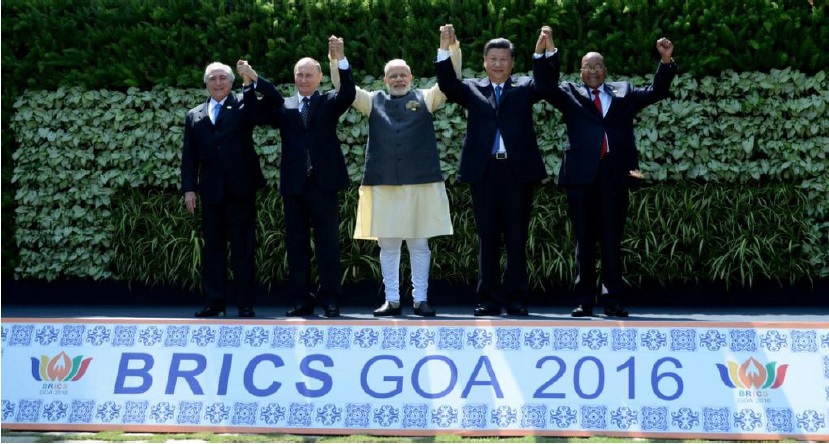By Siddharth Singh
BRICS nations are celebrating 10 years of partnership under BRICS. A decade of collaboration has produced strong benefits of cooperation. The footprint of intra-BRICS engagement has expanded over time to include large areas of economic activity. The scope of India’s partnership with other BRICS members stretches from agriculture to industry and innovation; trade to tourism; environment to energy; films to football; skill development to smart cities; and from fighting corruption and money laundering to securing our societies. The establishment of New Development Bank and the Contingency Reserve Arrangement are indeed signature achievements under BRICS umbrella.
In a world of new security challenges and continuing economic uncertainties, BRICS stands as a beacon of peace potential and promise. BRICS work holds much meaning for the developing world. The process of institution building in BRICS has continued to remain a focus area. The institutions that BRICS nation has build and intend to build in future, actually support the development of all countries and entire region. There has been greater flexibility and freedom, and wider choices in responding to the developmental priorities of BRICS nation. For example now BRICS nations also look forward to translating into reality the idea of a BRICS Credit Rating Agency.
The BRICS summit in Goa also stressed upon the need to speed up the work on setting up BRICS Agriculture Research Centre, BRICS Railway Research Network, and BRICS Sports Council. There is also a consensus and clear intentions of BRICS nations to build norms, create structures and pool the capacities to stop tax evasion, and fight against black money and corruption. Now BRICS nations must also build mechanisms of information sharing to bring to justice the tax offenders and money launderers. In future, BRICS should push for empowering the global governance institutions to reflect today’s reality.
The “Goa Declaration” of BRICS summit strongly condemned the recent several attacks, against some BRICS countries, including the Uri attack in India. The Goa declaration explicitly condemned terrorism in all its forms and manifestations and stressed that there can be no justification whatsoever for any acts of terrorism, whether based upon ideological, religious, political, racial, ethnic or any other reasons. BRICS nation also agreed to strengthen cooperation in combating international terrorism both at the bilateral level and at international fora.
In the past years, India under the umbrella of BRICS, have played an active role in shaping the global agenda for change and development. India’s association with Agenda 2030, the Paris Climate Agreement, and the Addis Ababa Action Agenda on Financing for Development has been purposeful and productive. And, India remains at the forefront of pushing change in the global governance architectures. India’s achievements have been substantial and so in future also India needs to sustain the positive direction and strong momentum of intra-BRICS engagement.
Under India’s Chairmanship of BRICS this year, India placed emphasis on digital- technology, smart-cities, urbanization, and cooperation between BRICS cities. On the issue of securing the societies from the menace of terrorism, India pushed for the cooperation on security and counter-terrorism issues among BRICS nations if all want to secure the lives of its citizens. Terrorism casts a long shadow on development and economic prosperity. Its reach is now global. It has grown more lethal and adept at the use of technology. So India highlighted that the response of BRICS nations to terrorism must, therefore, be nothing less than comprehensive and India also stressed upon the need to act both individually and collectively because selective approaches to terrorist individuals and organizations will not only be futile but also counter-productive. There must be no distinction based on artificial and self-serving grounds. Criminality should be the only basis for punitive action against the individuals and organizations responsible for carrying out terrorist acts. India strongly put forth its views in Goa summit that terrorist funding, their weapons supply, training and political support must be systematically cut off.The Goa declaration of BRICS summit is unanimous in recognizing the threat that terrorism, extremism and radicalization presents, not just to the regional but to the global peace, stability and economic prosperity. PM Modi underscored the need for close coordination on tracking sources of terrorist financing; and targeting the hardware of terrorism, including weapons’ supplies, ammunition, equipment, and training.
India took many new initiatives this year for example India took BRICS to the Indian cities and states and linked it directly to our people from different walks of life. The BRICS Films Festival, Trade Fair, Tourism Convention, Sports Council, Football Tournament and other related activities during the India’s chairmanship of BRICS this year, has resulted in creating millions of young stakeholders that will ultimately carry partnership forward among BRICS nations and its people.
The main highlight of the BRICS, Goa Summit, was the outreach to the BIMSTEC countries. The Heads of State, Heads of Government and Leaders from Bangladesh, Bhutan, Myanmar, Nepal, Sri Lanka, and Thailand, that together with India, collectively constitute the BIMSTEC, were in Goa as the special guests to 8th BRICS Summit. It was a unique opportunity for BRICS and BIMSTEC leaders where they all discussed and agreed upon the prospects for closer partnership and coordination. In future, as home to nearly two third of humanity, BRICS and BIMSTEC together can potentially unlock immense synergies with huge benefits for all the people living in the region.
(Siddharth Singh is Research Scholar at School of International Studies, Jawaharlal Nehru University, New Delhi)
(The views expressed are the author's own and do not necessarily reflect the position of the organisation)

